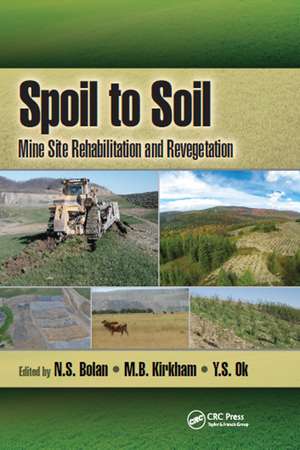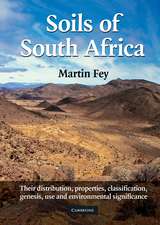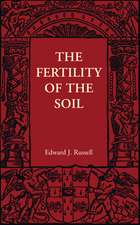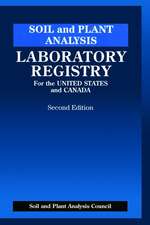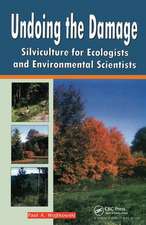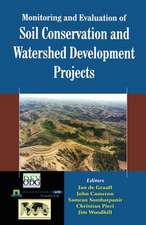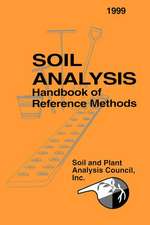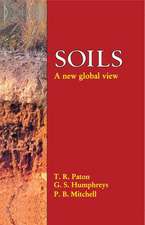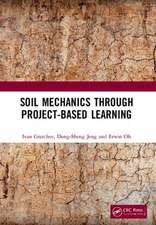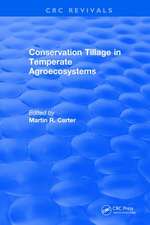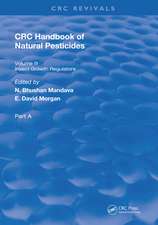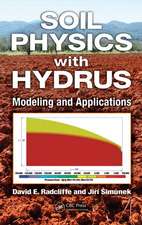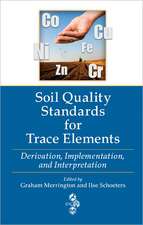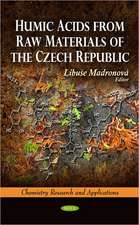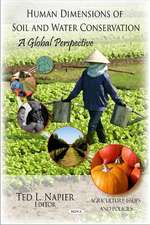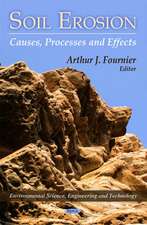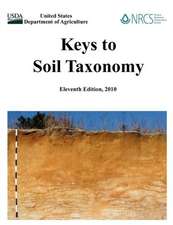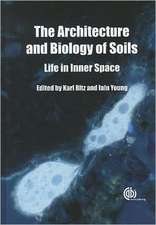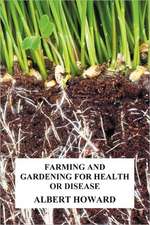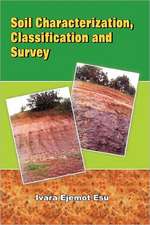Spoil to Soil: Mine Site Rehabilitation and Revegetation
Editat de N.S. Bolan, M.B. Kirkham, Y.S. Oken Limba Engleză Paperback – 30 iun 2021
The book provides a narrative of how inert spoil can be converted to live soil. Instructive illustrations show mine sites before and after rehabilitation. The purpose of this book is to provide students, scientists, and professional personnel in the mining industry sensible, science-based information needed to rehabilitate sustainably areas disturbed by mining activities.
This book is suitable for undergraduate and graduate students majoring in environmental, earth, and soil sciences; environmental and soil scientists; and mine site environmental engineers and regulators.
| Toate formatele și edițiile | Preț | Express |
|---|---|---|
| Paperback (1) | 452.99 lei 43-57 zile | |
| CRC Press – 30 iun 2021 | 452.99 lei 43-57 zile | |
| Hardback (1) | 1281.93 lei 43-57 zile | |
| CRC Press – 7 sep 2017 | 1281.93 lei 43-57 zile |
Preț: 452.99 lei
Nou
Puncte Express: 679
Preț estimativ în valută:
86.76€ • 89.38$ • 72.67£
86.76€ • 89.38$ • 72.67£
Carte tipărită la comandă
Livrare economică 24 februarie-10 martie
Preluare comenzi: 021 569.72.76
Specificații
ISBN-13: 9781032096414
ISBN-10: 1032096411
Pagini: 392
Ilustrații: 50 Illustrations, black and white
Dimensiuni: 178 x 254 mm
Greutate: 0.93 kg
Ediția:1
Editura: CRC Press
Colecția CRC Press
ISBN-10: 1032096411
Pagini: 392
Ilustrații: 50 Illustrations, black and white
Dimensiuni: 178 x 254 mm
Greutate: 0.93 kg
Ediția:1
Editura: CRC Press
Colecția CRC Press
Public țintă
Academic and Professional ReferenceCuprins
Contents
Foreword
Preface
Editors
Contributors
Section I Mine Site Characterization
Chapter 1 Characterization and Improvement in Physical, Chemical, and Biological
Properties of Mine Wastes
Binoy Sarkar, Hasintha Wijesekara, Sanchita Mandal, Mandeep Singh,
and N.S. Bolan
Chapter 2 Chemical Characterization of Mine Sites
Xinni Xiong, Daniel C.W. Tsang, and Y.S. Ok
Chapter 3 Sources and Management of Acid Mine Drainage
S.R. Gurung, Hasintha Wijesekara, Balaji Seshadri, R.B. Stewart,
P.E.H. Gregg, and N.S. Bolan
Section II Mine Site Rehabilitation Practices
Chapter 4 Use of Biowaste for Mine Site Rehabilitation: A Meta-Analysis
on Soil Carbon Dynamics
Hasintha Wijesekara, N.S. Bolan, Kim Colyvas, Balaji Seshadri,
Y.S. Ok, Yasser M. Awad, Yilu Xu, Ramesh Thangavel, Aravind Surapaneni,
Christopher Saint, and Meththika Vithanage
Chapter 5 Rehabilitation of Biological Characteristics in Mine Tailings
Longbin Huang and Fang You
Chapter 6 Nanoscale Materials for Mine Site Remediation
Tapan Adhikari and Rajarathnam Dharmarajan
Section III Post Mine Site Land-Use Practices
Chapter 7 Profitable Beef Cattle Production on Rehabilitated Mine Lands
Dee Murdoch and Rajasekar Karunanithi
Chapter 8 Restoring Forests on Surface Coal Mines in Appalachia: A Regional
Reforestation Approach with Global Application
Christopher D. Barton, Kenton Sena, Teagan Dolan,
Patrick Angel, and Carl Zipper
Chapter 9 Recreating a Headwater Stream System on a Valley Fill in Appalachia, USA
Carmen T. Agouridis, Christopher D. Barton, and Richard C. Warner
Chapter 10 Key Issues in Mine Closure Planning for Pit Lakes
Jerry A. Vandenberg and Cherie D. McCullough
Chapter 11 Carbon Sequestration Potential on Mined Lands
Sally Brown, Andrew Trlica, John Lavery, and Mark Teshima
Section IV Mine Site Revegetation Potential
Chapter 12 Phytotechnologies for Mine Site Rehabilitation
Ramesh Thangavel, Rajasekar Karunanithi, Hasintha Wijesekara, Yubo Yan,
Balaji Seshadri, and N.S. Bolan
Chapter 13 Phytocapping of Mine Waste at Derelict Mine Sites in New South Wales
Dane Lamb, Peter Sanderson, Liang Wang,
Mohammed Kader, and Ravi Naidu
Chapter 14 Rehabilitation of an Abandoned Mine Site with Biosolids
Abdulaziz Alghamdi, M.B. Kirkham, Deann R. Presley, Ganga Hettiarachchi,
and Leigh Murray
Chapter 15 Dynamics of Heavy Metal(loid)s in Mine Soils.
Anitha Kunhikrishnan, N.S. Bolan, Saikat Chowdhury, Jin Hee Park,
Hyuck Soo Kim, Girish Choppala, Bhupinder Pal Singh, and Won Il Kim
Section V C ase Studies of Successful
Mine Site Rehabilitation
Chapter 16 Mine Site Reclamation in Canada: Overview and Case Studies
Jin-Hyeob Kwak, Abimbola Ojekanmi, Min Duan, Scott X. Chang,
and M. Anne Naeth
Chapter 17 Case Studies of Successful Mine Site Rehabilitation: Malaysia
Soon Kong Yong and Suhaimi Abdul-Talib
Foreword
Preface
Editors
Contributors
Section I Mine Site Characterization
Chapter 1 Characterization and Improvement in Physical, Chemical, and Biological
Properties of Mine Wastes
Binoy Sarkar, Hasintha Wijesekara, Sanchita Mandal, Mandeep Singh,
and N.S. Bolan
Chapter 2 Chemical Characterization of Mine Sites
Xinni Xiong, Daniel C.W. Tsang, and Y.S. Ok
Chapter 3 Sources and Management of Acid Mine Drainage
S.R. Gurung, Hasintha Wijesekara, Balaji Seshadri, R.B. Stewart,
P.E.H. Gregg, and N.S. Bolan
Section II Mine Site Rehabilitation Practices
Chapter 4 Use of Biowaste for Mine Site Rehabilitation: A Meta-Analysis
on Soil Carbon Dynamics
Hasintha Wijesekara, N.S. Bolan, Kim Colyvas, Balaji Seshadri,
Y.S. Ok, Yasser M. Awad, Yilu Xu, Ramesh Thangavel, Aravind Surapaneni,
Christopher Saint, and Meththika Vithanage
Chapter 5 Rehabilitation of Biological Characteristics in Mine Tailings
Longbin Huang and Fang You
Chapter 6 Nanoscale Materials for Mine Site Remediation
Tapan Adhikari and Rajarathnam Dharmarajan
Section III Post Mine Site Land-Use Practices
Chapter 7 Profitable Beef Cattle Production on Rehabilitated Mine Lands
Dee Murdoch and Rajasekar Karunanithi
Chapter 8 Restoring Forests on Surface Coal Mines in Appalachia: A Regional
Reforestation Approach with Global Application
Christopher D. Barton, Kenton Sena, Teagan Dolan,
Patrick Angel, and Carl Zipper
Chapter 9 Recreating a Headwater Stream System on a Valley Fill in Appalachia, USA
Carmen T. Agouridis, Christopher D. Barton, and Richard C. Warner
Chapter 10 Key Issues in Mine Closure Planning for Pit Lakes
Jerry A. Vandenberg and Cherie D. McCullough
Chapter 11 Carbon Sequestration Potential on Mined Lands
Sally Brown, Andrew Trlica, John Lavery, and Mark Teshima
Section IV Mine Site Revegetation Potential
Chapter 12 Phytotechnologies for Mine Site Rehabilitation
Ramesh Thangavel, Rajasekar Karunanithi, Hasintha Wijesekara, Yubo Yan,
Balaji Seshadri, and N.S. Bolan
Chapter 13 Phytocapping of Mine Waste at Derelict Mine Sites in New South Wales
Dane Lamb, Peter Sanderson, Liang Wang,
Mohammed Kader, and Ravi Naidu
Chapter 14 Rehabilitation of an Abandoned Mine Site with Biosolids
Abdulaziz Alghamdi, M.B. Kirkham, Deann R. Presley, Ganga Hettiarachchi,
and Leigh Murray
Chapter 15 Dynamics of Heavy Metal(loid)s in Mine Soils.
Anitha Kunhikrishnan, N.S. Bolan, Saikat Chowdhury, Jin Hee Park,
Hyuck Soo Kim, Girish Choppala, Bhupinder Pal Singh, and Won Il Kim
Section V C ase Studies of Successful
Mine Site Rehabilitation
Chapter 16 Mine Site Reclamation in Canada: Overview and Case Studies
Jin-Hyeob Kwak, Abimbola Ojekanmi, Min Duan, Scott X. Chang,
and M. Anne Naeth
Chapter 17 Case Studies of Successful Mine Site Rehabilitation: Malaysia
Soon Kong Yong and Suhaimi Abdul-Talib
Notă biografică
Nanthi Bolan served as the Chair in Environmental Science and Dean of Graduate Studies at the University of South Australia. His teaching and research interests include agronomic value of manures, fertilisers and soil amendments, soil acidification, nutrient cycling, pollutant interactions in soils, and soil remediation.Nanthi is a Fellow of American Soil Science Society, American Society of Agronomy and New Zealand Soil Science Society, and was awarded the Communicator of the Year award by the New Zealand Institute of Agricultural Sciences. He has supervised a number of postgraduate students and was awarded the Massey University Research Medal for excellence in supervision. He has published more than 150 papers and is currently serving as the Associate Editor of Critical Reviews in Environmental Science and Technology.
Mary Beth Kirkham is a graduate of Wellesley College (B.A.), the University of Wisconsin, Madison (M.S. and Ph.D.), and is professor in the Department of Agronomy at Kansas State University, Manhattan. Kirkham is the author or co-author of over 250 contributions to scientific journals and is on the editorial boards of Soil Science, Soil Research, and Geoderma. Kirkham is a Fellow of the American Society of Agronomy, the Soil Science Society of America, the Crop Science Society of America, and the American Association for the Advancement of Science, and is on the Executive Committee of the International Union of Soil Science.
Dr. Yong Sik Ok is a Full Professor in the Division of Environmental Science and Ecological Engineering, Korea University, Seoul, Korea, where he also serves as Director of the Korea Biochar Research Center. His positions include Adjunct Professor at the University of Wuppertal, Germany, Adjunct Professor at the University of Southern Queensland, Australia, Guest Professor at China Jiliang University, China and Guest Professor at Ghent University Global Campus, Ghent University, Belgium. Prof. Ok holds a B.S., a M.Sc., and a Ph.D. from the Division of Environmental Science and Ecological Engineering, Korea University, Seoul. He was a Postdoctoral Fellow at the Department of Renewable Resources, University of Alberta and held Visiting Professorships in the Department of Renewable Resources (University of Alberta), in the Faculty of Bioscience Engineering (Ghent University), in the Department of Civil and Environmental Engineering (Hong Kong Polytechnic University) and in the Department of Chemical and Biomolecular Engineering (National University of Singapore). Prof. Ok's research interests include waste management, bioavailability of emerging contaminants, and bioenergy and value-added products such as biochar. He also has experience in fundamental soil science and remediation of various contaminants in soils and sediments. Together with graduate students and colleagues, Prof. Ok has published over 400 research papers.
Descriere
The remediation of mine spoil is a global environmental issue affecting most nations. This book covers both the fundamental and practical aspects of remediation and revegetation of mine site spoils. It follows three major themes including characterisation of mine site spoils; remediation of chemical, physical, and biological constraints of mine
